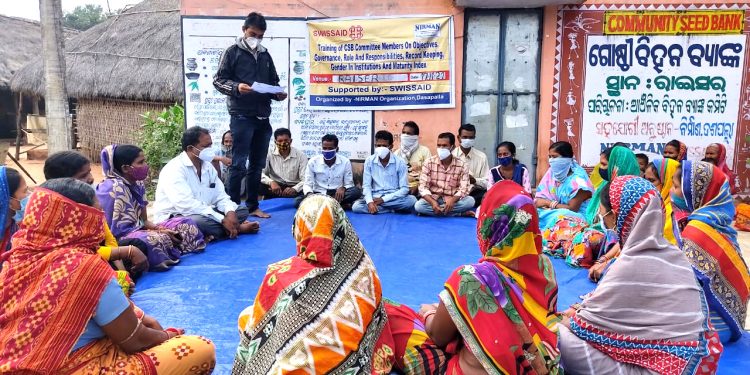Nayagarh: A community seed bank in Daspalla block of this district housing indigenous varieties of paddy seeds has brought a ray of hope for farmers who till now depend on government-supplied high-yielding varieties of paddy seeds.
Farmlands are fast shrinking in the district due to a steady rise in population. Farmers living in the riparian villages and hilly areas have almost forgotten these indigenous varieties.
Indigenous varieties of paddy seeds like ‘Karpurakeli’, ‘Bayabhanda’, ‘Kasurichampa’, ‘Mayurkanta’, ‘Rangamachhakanta’, ‘Bhutia’, ‘Jangalijata’, ‘Kalajeera’, ‘Gopalbhog’, ‘Tulasi’, ‘Chinamali’, ‘Varsha’, ‘Paunji’, ‘Kalakoili’, ‘Sariageta’, ‘Jhumpuri’, ‘Boudiachampa’, ‘Magura’, ‘Nrupatibhog’, ‘Mukusala’, ‘Alandhukuta’, ‘Landi’, ‘Kajalchampa’ and ‘Badatulasi’ are no more seen in the district.
The community seed bank set up by farmers at Raisar village has come at a time when hopes of availing indigenous varieties of paddy seeds were diminishing.
As of now, the seed bank stores 44 varieties of indigenous seeds as well as seeds of black grams, green grams, chana, seasame and country crops like ‘Janha’, ‘Guruchi’, ‘Suan’, ‘Kangula’ and ‘Kangu’.
The basic aim of this seed bank is to collect indigenous varieties of paddy seeds and store them for future use.
The seed bank has been established by 599 farmers from Barapalli, Satajhari, Gothasahi and Andharkota villages under Sariganda panchayat as well as Gambharikhol, Jamusahi, Raisar, Bidapaja and Jhunkamara of Lakshmipur panchayats.
Farmers of Kadalibari, Siligadi, Champadai,Khajuridiha, Khalisahi, Khandadhara, Janisahi and Rimada areas are also involved in the establishment of the seed bank.
Here, farmers store the indigenous varieties of paddy seeds, other food crops and supply them to interested farmers free of cost. However, they take back seeds thrice the quantity of what they give after harvesting.
The bank members also collect indigenous paddy seeds and of other crops free of cost for storage when they visit any village, district headquarters or any place outside the state.
Purna Chandra Pradhan of Barpalli village said the process of storing seeds is purely traditional. They store the seeds in earthen pots and cover their mouths with straws and apply clay to extend their life.
Farmers said members of the seed bank have adopted organic method of cultivation. They have adopted row farming method of cultivation too. They pick up paddy saplings and transplant them in rows keeping a distance of 20 cm between saplings.
Each sapling delivers 18 to 20 pills and nine to 10 quintals of paddy is harvested from an acre.
Pradipta Mallick of Gambharikhol village, said all farmers in the district should adopt indigenous paddy farming on a large scale as it is safe for sick people, including patients with diabetes.
He said farmers and residents should make efforts for establishment of community seed banks in villages and promote organic farming. Jayanti Pradhan of Bidapaju village said the government does not encourage or sponsor cultivation of indigenous paddy.
Rampant use of chemical fertilizers results in spread of diseases which can be avoided if farmers adopt organic method of cultivation with the use of indigenous seeds.
PNN






































